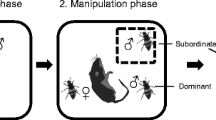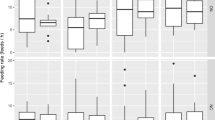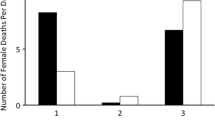Abstract
Negotiation models of biparental care predict that parents should partially compensate for a reduction in the level of care that their partner provides. A number of studies, mostly with monogamous birds, have tested this prediction by removing or manipulating the level of effort of one parent and then measuring the response of the other parent. In this study, we test this prediction with the burying beetle Nicrophorus orbicollis, which breeds on small vertebrate carcasses and provides biparental care to their young. We reduced the effort of either the male or female parent by attaching a weight to their elytron and evaluated the effect that their reduction in time spent providing care had on their partner’s level of effort during the carcass preparation stage of reproduction. After their partner was weighted, males increased the time spent preparing the carcass by 28 %. Females were already spending nearly 100 % of their time working and observed changes in effort were negligible. Our results show that parents directly monitor their partner’s level of effort in the carcass preparation stage of reproduction. This is the first handicapping study in an invertebrate species to provide support for the negotiation model of intersexual conflict over parental investment.

Similar content being viewed by others
References
Bartlett J (1987) Filial cannibalism in burying beetles. Behav Ecol Sociobiol 21:179–183
Beaulieu M, Raclot T, Dervaux A, Le Maho Y, Ropert-Coudert Y, Ancel A (2009) Can a handicapped parent rely on its partner? An experimental study within Adélie penguin pairs. Anim Behav 78:313–320
Boncoraglio G, Kilner RM (2012) Female burying beetles benefit from male desertion: sexual conflict and counter-adaptation over parental investment. PLoS ONE 7:e31713. doi:10.1371/journal.pone.0031713
Burley N (1986) Sexual selection for aesthetic traits in species with biparental care. Am Nat 127:415–445
Cotter SC, Ward RJS, Kilner RM (2011) Age-specific reproductive investment in female burying beetles: independent effects of state and risk of death. Funct Ecol 25:652–660
Creighton JC (2005) Population density, body size, and phenotypic plasticity of brood size in a burying beetle. Behav Ecol 16:1031–1036
Creighton JC, Heflin ND, Belk MC (2009) Cost of reproduction, resource quality, and terminal investment in a burying beetle. Am Nat 174:673–684
Fetherston IA, Scott MP, Traniello JFA (1990) Parental care in burying beetles: the organization of male and female brood-care behavior. Ethology 85:177–190
Fetherston IA, Scott MP, Traniello JFA (1994) Behavioral compensation for mate loss in the burying beetle Nicrophorus orbicollis. Anim Behav 47:777–785
Harrison F, Barta Z, Cuthill I, Székely T (2009) How is sexual conflict over parental care resolved? A meta-analysis. J Evolution Biol 22:1800–1812
Hinde CA (2006) Negotiation over offspring care?—a positive response to partner-provisioning rate in great tits. Behav Ecol 17:6–12
Hinde CA, Kilner RM (2007) Negotiations within the family over the supply of parental care. Proc R Soc B 274:53–60
Houston AI, Davies NB (1985) The evolution of co-operation and life history in the dunnock, Prunella modularis. In: Sibly RM, Smith RH (eds) Behavioural ecology: ecological consequences of adaptive behaviour. Blackwell Scientific, Oxford, pp 471–487
Houston AI, Székely T, McNamara JM (2005) Conflict between parents over care. Trends Ecol Evol 20:33–38
Hunt J, Simmons LW (2002) Behavioural dynamics of biparental care in the dung beetle Onthophagus taurus. Anim Behav 64:65–75
Jenkins EV, Morris C, Blackman S (2000) Delayed benefits of paternal care in the burying beetle Nicrophorus vespilloides. Anim Behav 60:443–451
Johnstone RA, Hinde CA (2006) Negotiation over offspring care—how should parents respond to each other’s efforts? Behav Ecol 17:818–827
Jones KM, Ruxton GD, Monaghan P (2002) Model parents: is full compensation for reduced partner nest attendance compatible with stable biparental care? Behav Ecol 13:838–843
Kosztolányi A, Cuthill IC, Székely T (2009) Negotiation between parents over care: reversible compensation during incubation. Behav Ecol 20:446–452
Lendvai AZ, Chastel O (2008) Experimental mate-removal increases the stress response of female house sparrows: the effects of offspring value? Horm Behav 53:395–401
Lendvai AZ, Barta Z, Chastel O (2009) Conflict over parental care in house sparrows: do females use a negotiation rule? Behav Ecol 20:651–656
Mazuc J, Chastel O, Sorci G (2003) No evidence for differential maternal allocation to offspring in the house sparrow (Passer domesticus). Behav Ecol Sociobiol 14:340–346
McNamara JM, Gasson CE, Houston AI (1999) Incorporating rules for responding into evolutionary games. Nature 401:368–371
McNamara JM, Houston AI, Barta Z, Osorno JL (2003) Should young ever be better off with one parent than with two? Behav Ecol 14:301–310
Müller JK, Eggert AK, Sakaluk SK (1998) Carcass maintenance and biparental brood care in burying beetles: are males redundant? Ecol Entomol 23:195–200
Parker GA (2006) Sexual conflict over mating and fertilization: an overview. Philos T Roy Soc B 361:235–259
Rauter CM, Moore AJ (1999) Do honest signaling models of offspring solicitation apply to insects? P Roy Soc Lond B Bio 266:1691–1696
Rauter CM, Moore AJ (2004) Time constraints and trade-offs among parental care behaviours: effects of brood size, sex, and loss of mate. Anim Behav 68:695–702
Sakaluk SK, Eggert AK, Müller JK (1998) The ‘widow effect’ and its consequences for reproduction in burying beetles. Ethology 104:553–564
Sanz JJ, Kranenbarg S, Tinbergen JM (2000) Differential response by males and females to manipulation of partner contribution in the great tit (Parus major). J Anim Ecol 69:74–84
Schwagmeyer PL, Mock DW, Parker GA (2002) Biparental care in house sparrows: negotiation or sealed bid? Behav Ecol 13:713–721
Schwagmeyer PL, Schwabl HG, Mock DW (2005) Dynamics of biparental care in house sparrows: hormonal manipulations of paternal contributions. Anim Behav 69:481–488
Scott MP (1998) The ecology and behavior of burying beetles. Annu Rev of Entom 43:595–618
Scott MP, Traniello JFA (1990) Behavioural and ecological correlates of male and female parental care and reproductive success in burying beetles (Nicrophorus spp.). Anim Behav 39:274–283
Sheldon BC (2000) Differential allocation: tests, mechanisms and implications. Trends in Ecol and Evol 15:397–402
Slagsvold T, Lifjeld JT (1990) Influence of male and female quality on clutch size in tits (Parus spp.). Ecology 71:1258–1266
Smiseth PT, Moore AJ (2004) Behavioral dynamics between caring males and females in a beetle with facultative biparental care. Behav Ecol 15:612–628
Smiseth PT, Dawson C, Varley E, Moore AJ (2005) How do caring parents respond to mate loss? Differential response by males and females. Anim Behav 69:551–559
Smiseth PT, Musa S, Moore AJ (2006) Negotiation between parents: does the timing of mate loss affect female compensation in Nicrophorus vespilloides? Behaviour 143:293–301
Steinegger M, Taborsky B (2007) Asymmetric sexual conflict over parental care in a biparental cichlid. Behav Ecol Sociobiol 61:933–941
Stoehr AM, Hill GE (2000) Testosterone and the allocation of reproductive effort in male house finches (Carpodacus mexicanus). Behav Ecol Sociobiol 48:407–411
Suzuki S, Nagano M (2009) To compensate or not? Caring parents respond differentially to mate removal and mate handicapping in the burying beetle, Nicrophorus quadripunctatus. Ethology 115:1–6
Tajima K, Nakamuara M (2003) Response to manipulation of partner contribution: a handicapping experiment in the barn swallow. Ornithol Sci 2:65–72
Trumbo ST (1991) Reproductive benefits and the duration of paternal care in a biparental burying beetle, Nicrophorus orbicollis. Behaviour 117:82–105
Trumbo ST (2006) Infanticide, sexual selection and task specialization in a biparental burying beetle. Anim Behav 72:1159–1167
Trumbo ST, Fernandez AG (1995) Regulation of brood size by male parents and cues employed to assess resource size by burying beetles. Ethol, Ecol and Evol 7:113–122
Wiebe KL (2010) Negotiation of parental care when the stakes are high: experimental handicapping of one partner during incubation leads to short-term generosity. J Anim Ecol 79:63–70
Wilson DS, Fudge J (1984) Burying beetles: intraspecific interactions and reproductive success in the field. Ecol Entomol 9:195–203
Wright DS, Cuthill I (1989) Manipulations of sex differences in parental care. Behav Ecol Sociobiol 25:171–181
Wright DS, Cuthill I (1990a) Biparental care: short-term manipulation of partner contribution and brood size in the starling, Sturnus vulgaris. Behav Ecol 1:116–124
Wright DS, Cuthill I (1990b) Manipulations of sex differences in parental care: the effect of brood size. Anim Behav 40:462–471
Acknowledgments
This research was funded in part by an undergraduate research grant from Purdue University Calumet. We thank D. Mock, A. Moore, S. Sakaluk, and S. Trumbo for their constructive reviews of our manuscript. We also thank N. Heflin and S. Zlotorzynski for assistance in maintaining laboratory animals and J. Shoup and S. Shoup for allowing us to collect beetles on their property.
Conflict of interest
The authors declare that they have no conflicts of interest.
Ethical standards
The experiments described herein comply with the current laws of the USA, the country in which they were performed.
Author information
Authors and Affiliations
Corresponding author
Additional information
Communicated by S. Sakaluk
Rights and permissions
About this article
Cite this article
Creighton, J.C., Smith, A.N., Komendat, A. et al. Dynamics of biparental care in a burying beetle: experimental handicapping results in partner compensation. Behav Ecol Sociobiol 69, 265–271 (2015). https://doi.org/10.1007/s00265-014-1839-z
Received:
Revised:
Accepted:
Published:
Issue Date:
DOI: https://doi.org/10.1007/s00265-014-1839-z




